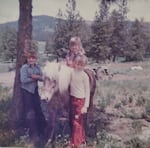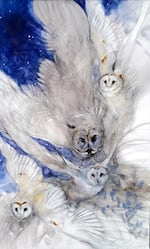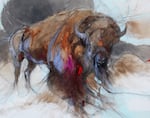Autumn in Northeastern Oregon shows up in the muted gray-green vista of Ponderosa pine and sagebrush, blended with the golds of dry grass and tamarack turning. The air is crisp and has what long-time resident Amy Lay calls “a magical snap to it.” Other than a two-lane road winding through it, the wide-open landscape that Lay calls home shows no trace of civilization.
“We’re just inside Union County. Baker County line is just on the other side of this hill, in the Wallowa Mountains,” explains Lay.
She stands in a corral, nuzzled by horses as tame as house pets and eagerly trailed by a dusty dog called “Bear.” It’s a little hard to imagine that such a quiet, remote place would be home to a highly successful contemporary wildlife artist. But then again, it might be the perfect spot for one.
“I think isolation can be a wonderful thing for creativity,” says Lay.
Lay’s great-grandparents homesteaded here, returning at the beginning of the 20th century after following the Oregon Trail all the way to the Willamette Valley. It was an unusual move.
“They actually made it to Oregon City and came back to Eastern Oregon because I think they saw this spot on the way,” she says.

Amy Lay’s ancestors settled beside a natural meadow known as “the park,” a few miles from Medical Springs, Oregon.
Dan Evans / OPB
Lay’s ancestors settled beside a natural meadow known as “the park,” a few miles from Medical Springs, Oregon. For countless generations, the thermal hot springs that surface at the townsite were visited by Indigenous peoples. In the 1860s, the town grew up around them and became a popular resort that served local settlers, miners, and later, workers from a bustling lumber mill in nearby Pondosa. The area thrived until the mill burned down and the resort’s hot spring pool closed in the 1950s. Much of the population moved away, but the Lay homestead remained.
“So, for my whole family, this is kind of the — it’s in our hearts, this place.”
The land has been in the family’s hands for five generations now and even in the 21st century, the sound of a passing car is rare. That remoteness had a big influence on Lay’s childhood.

Amy Lay with her brothers on their family homestead near Medical Springs, Oregon.
Courtesy of Amy Lay
“I didn’t have a lot of other little girlfriends as a child. I had some brothers. But they were different ages than me and we were just different.”
For companionship, Lay sought out the animals that populated the landscape.
“I found joy with animals and they became my allies,” she recalls. That connection to fauna large and small also became her lifeline.
“We moved away from here for a while and so I would draw them because I missed them. And I drew and drew and drew. And one of my goals was, I want to be able to draw any animal. And it was a game. And I think it got me through that loneliness.”

"Mustangs and Mountains" 36x72, oil and charcoal on canvas by Amy Lay The cool blue mountains and sagebrush with the powerful spirit of mustangs framed between remind artist Amy Lay of her family's homestead in eastern Oregon.
Courtesy of the artist
Lay’s single-minded quest to summon any animal into existence with nothing more than a pencil has served her well in the competitive contemporary art world.
“Not saying that it’s anatomically correct but it’s from my imagination,” she says. “I think now that’s why my work looks different than everyone else’s because my animals don’t look perfect.”

"Indigo Stars" 48x24, oil and charcoal on canvas by Amy Lay
Courtesy of the artist
Lay’s charcoal pencil drawings of elk, deer, squirrels, and especially horses show up in oil paintings done with a watercolor technique in striking forms she calls “Amy animals.”
Today, Lay’s family homestead is supported by a thriving market of distant art collectors instead of annual hay harvests. Her work shows in galleries and museums from Montana to Vermont to Georgia, which she often delivers in-person by cross-country drive. Add to that, a constant stream of private commissions and Lay’s life is busier than most urbanites.

"Rebel" 48 x 60, oil and charcoal on canvas, by Amy Lay, 2020
Courtesy of the artist
“I’ve seen other places in the country and in the world now and I still just like it here the best,” she admits. “I feel very fortunate being here, that my children get to be here and we’re hoping we can keep it going. It’s hard to do after so many generations.”
